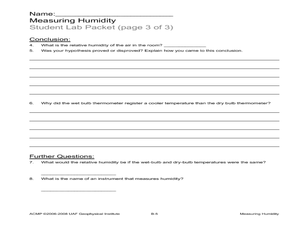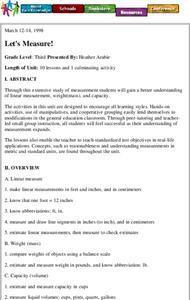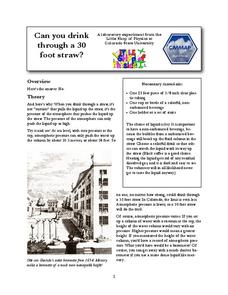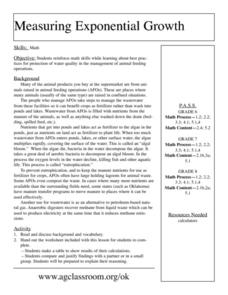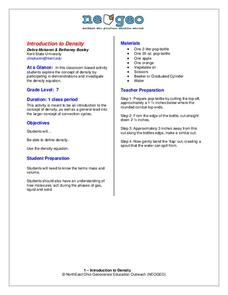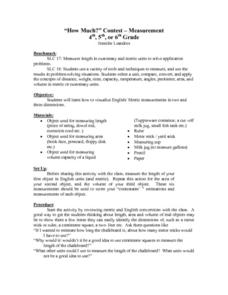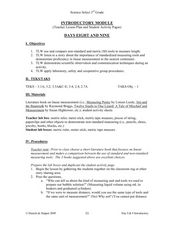DiscoverE
Bridges, Buildings and Beyond Activity Packet: Grades 6-8
Pour a solid foundation of engineering into the minds of future engineers. Scholars take part in three activities to learn about civil engineering. They build a model of a cable-stayed bridge, conduct an experiment to see the effects of...
Curated OER
Compared to What? Comparing the Density of Different Liquids
Students work in groups to compare the density of different liquids. In this density lesson, students use cooking oil, liquid detergent and water to measure density. Students record their results and check the accuracy of...
Curated OER
Measuring Humidity
Students measure humidity in the classroom. In this weather lesson, students use a psychrometer to measure the humidity in the classroom. Students complete a lab packet.
Curated OER
Elementary Exploration: Liquids
Students study the attributes of liquids. In this science exploration instructional activity, students participate in a hands-on activity that requires them to examine the volume and shape of liquid.
Curated OER
Let's Measure
Third graders practice measuring different objects. They discover the concepts of ratio and proportion and practice converting numbers into the correct unit. They read stories as well to help them with the concepts.
Curated OER
Liquids in Bottles
Students investigate different liquids to develop their concept of a liquid. They work at a center to tip, swirl, shake, roll, and otherwise investigate seven liquids in small, clear plastic bottles: plain water, corn syrup, liquid...
Curated OER
Measuring With Fluids
Students investigate the concept of measurement for capacity and they use real containers to be filled of different sizes. Students use the scoops as the number of units for counting the capacity volume. Then they order the containers by...
Kenan Fellows
Density
Most scholars associate density with floating, but how do scientists determine the exact density of an unknown liquid? The third lesson in a seven-part series challenges scholars to find the mass and volume of two unknown liquids. Each...
NASA
States of Matter
Water, one of the basic needs of humans, is found in all three states of matter on Earth; no other planet—that we know of—possesses this quality. Here is a unit that allows learners to explore through experimentation what it...
Colorado State University
Can You Drink Through a 30 Foot Straw?
Drinking straws are a pretty simple device ... or, are they? Explore the possibility of sipping a beverage 30 feet away with an engaging activity that's sure to keep pupils guessing. Just place a long piece of plastic tubing in a glass,...
University of Georgia
Splat!
What does viscosity have to do with splatter? An activity shows that the viscosity of a substance is inversely proportional to the distance of its splatter. Learners conduct the experiment by collecting data, graphing, and analyzing...
LABScI
Cell Diffusion and Permeability: The See-Thru Egg Lab
Create a model to study a microscopic phenomenon. The seventh of 12 lessons uses an egg (without its shell) to represent a cell membrane. Using different solutions, learners explore the concept of cell diffusion. They monitor...
Curated OER
Measuring Exponential Growth
Students reinforce math skills while learning about best practices
for protection of water quality in the management of animal feeding
operations. They make a table to show results of their calculations and compare and justify findings...
NorthEast Ohio Geoscience Education Outreach
Introduction to Density
Seventh grade scientists weigh in on the concept of density. In a nutshell, they participate in the following activities:
Measurement of the mass and volume of fruit in order to compare densities
Measurement of the mass of oil and water...
Curated OER
"How Much?" Contest - Measurement
Students work with measurements of length, area, and volume capacity of a liquid. They watch a teacher demonstration of both English and metric units before they estimate and take actual measurements of assigned items a three different...
American Chemical Society
Density of Water
We know solids have a density we can measure, but what about liquids? Lesson explores this concept and allows scholars to explore the relationship between volume and density. Graphing and analysis questions round out the activity.
Baylor College
Serving Sizes
Are serving sizes for different foods always appropriate for what you need? In this hands-on activity, learners work in groups to estimate what one serving size of various foods are, and then evaluate their hypotheses by measuring...
Consortium for Ocean Science Exploration and Engagement (COSEE)
Ocean Acidification: Whats and Hows
Open this instructional activity by demonstrating the production of acidic carbon dioxide gas by activated yeast. Emerging ecologists then experiment with seashells to discover the effect of ocean acidification on shelled marine...
Berkshire Museum
Where’s the Water?: Acting Out Science Cycles
Young scientists transform themselves into rivers, oceans, clouds, and drops of water in order to explore the water cycle. After assigning and explaining to students their different roles in the activity, the teacher reads aloud a...
American Chemical Society
Production of a Gas - Controlling a Chemical Reaction
Though the publisher designated this unit for use with third through eighth grades, this particular lesson would be best used with middle schoolers due to the specific measurement skills required. Basically, they set up the reaction...
Curated OER
A Comparison of Polymeric Liquids with Newtonian Liquids
Students perform several tests on liquids. In this general science lesson, students compare the properties of polymeric and nonpolymeric liquids. They explain the composition and importance of macromolecules.
Curated OER
What's The Scoop?
Students explore the properties of matter. In this cross curriculum three states of matter science lesson, students listen to the poem "Eighteen Flavors" by Shel Silverstein, and predict what will happen if listed ingredients are...
Curated OER
Introductory Module
Third graders examine the non-standard method of measurement and compare it to the metric system of measurement. In this introductory module lesson, 3rd graders discover the scientific observation. Students also develop communication...
Curated OER
Jr. Chef Club
Students examine the food pyramid. In this health/math lesson students make biscuits. Students are assigned a group to measure out ingredients. Students also discuss which part of the food pyramid biscuits fall into and the nutritional...




